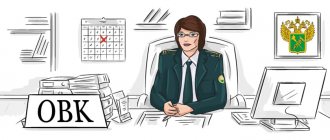Administrative responsibility for accounting
An accountant is liable under the Code of Administrative Offenses of the Russian Federation if he does not fulfill or improperly fulfills his official duties. Makes serious mistakes in accounting. Basis - art. 15.11 Code of Administrative Offenses of the Russian Federation. But there is a nuance - the accountant’s guilt must be proven and the statute of limitations must be met.
Responsibility arises for errors that lead to distortion of any indicator of financial statements, registration of imaginary transactions and objects.
The fine is from 5,000 to 10,000 rubles. For a repeated violation, an accountant may be disqualified for a period of one to two years.
The accountant is not responsible if the financial statements are distorted by:
- through the fault of other persons who compiled unreliable primary accounting documents;
- due to the fact that third parties did not provide primary accounting documents.
We have collected other fines from the Code of Administrative Offenses of the Russian Federation that threaten an accountant for violations in the field of accounting in the Table.
We check documents when taking office
The chief accountant is not responsible for the accounting of his predecessor. However, mistakes made by the previous chief accountant may have a negative impact on future accounting.
The transfer of affairs when changing the chief accountant should be formalized by an act. The act of transfer of affairs is drawn up in free form and serves as a safety net for the new chief accountant in case of claims from the manager.
The act indicates the list of documents and the period for which the cases are transferred. You can attach a balance sheet with the signature of the manager and the former chief accountant to the act - this document will confirm the account balances as of the date of transfer of affairs.
The Federal Tax Service can check the accounting records for the last three years of the company’s operation (clause 4 of Article 89 of the Tax Code of the Russian Federation). When accepting business, focus on this period.
What to ask from the previous chief accountant when transferring affairs
- Constituent and registration documents (charter, certificates of registration and registration).
- Accounting policies and appendices thereto.
- Reporting (balance sheet, declarations, books of purchases and sales, reporting to funds, statistical reporting).
- Inventory records.
- Correspondence with regulatory authorities, reconciliation reports on taxes and contributions, requirements and results of inspections.
- Job descriptions for accounting employees.
- Agreements with suppliers, customers, employees, banks, founders, etc.
- Documents on salaries and personnel (staffing schedule, timesheets, etc.).
- Cash and bank documents.
- Reconciliation reports with debtors and creditors.
- Source documents.
- Powers of attorney.
- Access to accounting software or database.
- Passwords and electronic signature keys for Internet banking, if the director gives access to it.
- Turnover balance sheets for accounting accounts.
act of acceptance and transfer of documents of the chief accountant
Disciplinary responsibility
The Labor Code of the Russian Federation divides disciplinary liability into reprimand, reprimand and dismissal (Article 192). All these measures apply to all employees of the organization.
In addition, the employer has an additional basis for severing the employment relationship with the accountant - the accountant’s lack of professionalism, which resulted in damage. This is how it sounds in the language of the law: “An employment contract can be terminated at the initiative of the employer in connection with the adoption of an unfounded decision by the chief accountant, which entails a violation of the safety of property, its unlawful use or other damage to the property of the organization” (Clause 9, Part 1, Art. 81 Labor Code of the Russian Federation).
Who is the founder
The activities of LLCs in the Russian Federation are subject to the requirements of Law No. 14-FZ “On Limited Liability Companies” dated 02/08/98. The current version states that a founder is a person:
- ratifying the organization's charter;
- contributing funds to the authorized capital;
- selecting management and appointing inspections of its activities;
- having the decisive right to vote when making decisions about the company's activities.
The founder can be a legal entity or an individual. It is not necessary to have Russian citizenship; a non-resident can organize an LLC. Deputies, military personnel and a number of officials are not allowed to become organizers of an LLC.
Material liability
The accountant bears financial responsibility for errors in his work. This arises only for direct actual damage that occurs to the employer due to an accountant’s mistake. And if errors lead to a real decrease in the employer’s property or funds, then the accountant is obliged to compensate the employer for the damage caused (Article 238 of the Labor Code of the Russian Federation).
At the same time, an accountant, as an employee, does not bear financial responsibility for tax violations. In letter dated August 22, 2014 No. 03-04-06/42105, the Ministry of Finance explained that an administrative fine paid due to the fault of an employee is damage to the employer and the employer has the right to demand compensation from the employee. But in fact, an employer’s fine for tax offenses committed through the fault of an accountant cannot be considered as damage to the employer. A fine is a measure of liability for improper performance by a taxpayer of his duties. The organization itself, and not the accountant, acts on the taxpayer’s side.
The employer himself bears all responsibility for violations, for example, of deadlines for filing tax returns and paying taxes. The accountant is not obliged to compensate the employer for fines for committing tax offenses (see, for example, the appeal ruling of the Moscow City Court dated March 26, 2019 No. 33-13062/2019).
Example.
The accountant erroneously calculated and paid an inflated salary to an employee. As a result, the employer suffered damages.
It is possible to recover damages from an accountant that does not exceed the employee’s average monthly earnings by order of the employer, and in other cases only through the court.
If an agreement on full financial liability has not been signed with the accountant, he will compensate for the damage caused within the accountant’s monthly salary (Article 241 of the Labor Code of the Russian Federation).
To recover damages in full, an agreement on full financial liability is signed with the accountant.
What role does accounting play?
Every company strives to earn maximum profits. But achieving the best result is impossible without an effective and clear distribution of financial flows. For this purpose, a special system is created that provides accurate accounting of business transactions, recording cash flows and inventory items.
The results of proper organization of accounting are as follows:
- cost optimization;
- control of company cash flows;
- extracting maximum efficiency in the distribution of funds;
- easier to analyze reports.
All types of business entities, with the exception of merchants, are required to maintain accounting records. They take into account income and expenses using slightly different methods, which are provided by law.
Also see “Professional standard for an accountant: how and why to apply it.”
Criminal liability of an accountant
Evasion of taxes, fees, insurance premiums or failure by an organization to fulfill the duty of a tax agent leads to criminal liability.
The chief accountant can be brought to such responsibility if he consciously (deliberately) participated in the commission of crimes (Articles 199, 199.1, 199.4 of the Criminal Code of the Russian Federation, paragraphs 3, 7, 17 of the Resolution of the Plenum of the Armed Forces of the Russian Federation dated December 28, 2006 No. 64). Plus, in order for the perpetrators to fall under the article, the organization must have arrears in contributions, taxes and fees in a large amount (from 5 million rubles) or in an especially large amount (from 15 million rubles).
If the crime was committed for the first time, then you can be released from criminal liability - for this you need to fully repay the arrears, pay penalties and a fine.
It is difficult to bring a chief accountant to criminal liability, since it is difficult to prove that he intentionally acted to evade taxes, and not simply due to insufficient qualifications, a banal mistake, etc.
About the basic principles and rules
- Mandatory record keeping based on primary documents, samples of which are in the public domain. If there are no forms, the manager himself can approve them.
- Application of a standard chart of accounts, which is a systematic set of data, synthetic and analytical.
Accounting principles - Carrying out inventories in order to establish a correspondence between documentary and real data. The manager issues a special act in which he approves the timing of the procedure and its order.
- Maintaining separate records of business transactions and property, obligations of partners. It is organized continuously, from the moment of opening until the company goes through liquidation. This uses the so-called double entry method.
- Carrying out accounting registration. Information accepted for accounting must be accumulated and registered in special storage systems.
- Property, liabilities and expenses require separate accounting.
- Using the Russian language along with Russian currency.
- Valuation of property in monetary terms.
Accountant's responsibility after dismissal
The accountant bears administrative responsibility for errors made in the field of accounting and reporting as an official of the employing organization. The question arises: can an accountant be held accountable for such liability after dismissal, when he ceases to be an official?
Yes they can. Dismissal does not relieve the accountant from administrative liability for committing offenses during the performance of official duties. But it is worth remembering the statute of limitations for bringing to administrative responsibility. They are spelled out in Art. 4.5 Code of Administrative Offenses of the Russian Federation.
Table of fines for accountants for violations in the field of accounting and tax reporting
| The norm where the fine is prescribed | What is the fine for? | Amount of fine |
| Art. 15.6 Code of Administrative Offenses of the Russian Federation | Failure to provide (failure to report) information required for tax control | from 300 to 500 rub. |
| Art. 15.5 Code of Administrative Offenses of the Russian Federation | Violation of deadlines for submitting a tax return and calculating insurance premiums | from 300 to 500 rub. |
| Art. 19.7 Code of Administrative Offenses of the Russian Federation | Failure to submit annual financial statements and audit report to the tax authorities | from 300 to 500 rub. |
| Part 1 Art. 15.3 Code of Administrative Offenses of the Russian Federation | Violation of the deadline for filing an application for registration with the tax authority | from 500 to 1,000 rub. |
| Art. 19.4 Code of Administrative Offenses of the Russian Federation | Failure to comply with a legal requirement of a tax official | from 2,000 to 4,000 rubles. |
| Art. 15.11 Code of Administrative Offenses of the Russian Federation | Gross violation of accounting requirements, including accounting (financial) reporting | from 5,000 to 10,000 rubles. |
Who is responsible for labor protection if the organization has less than 50 employees
If the organization has less than 50 employees, the decision to create an occupational safety service or introduce the position of an occupational safety specialist is made by the head of the organization (Parts 2, 3 of Article 217 of the Labor Code of the Russian Federation).
Labor protection functions can be performed by:
- the head of the organization personally;
- an authorized employee, such as a personnel officer or accountant;
- an organization or specialist that provides services in the field of labor protection.
In this case, they are involved in work under a civil contract.
1. How to entrust occupational safety functions to a responsible employee
- If the organization's staffing table does not include the position of occupational safety specialist , it is possible to entrust occupational safety work to an employee only by combining positions. Despite the fact that this form of additional work implies the presence of a vacant position, this case is an exception (Part 3 of Article 217 of the Labor Code of the Russian Federation).
Labor protection functions can be performed by any employee of the organization, including a personnel officer, if he has the appropriate training or experience in this area (Article 217 of the Labor Code of the Russian Federation).
The level of training of such an employee must meet the requirements of the professional standard “Specialist in the field of labor protection”, approved. By Order of the Ministry of Labor dated August 4, 2014 No. 524n:
- higher education in the field of “Technosphere Safety”, that is, specialized in labor protection. Any non-core higher education will do - humanitarian or technical, it makes no difference, and professional retraining in labor protection;
- any secondary vocational education, professional retraining in labor protection and three years of work experience.
An employee responsible for labor protection will have to undergo additional training and certification in the field of industrial safety in one case - if the organization has hazardous production facilities.
If a personnel officer or other employee who is appointed responsible for labor protection does not have the necessary professional education, he needs to undergo:
- professional retraining in this area;
- training in labor protection in a training center accredited by the Ministry of Labor of Russia, which has a license for educational activities. This is the requirement of clause 2.3.2. The procedure for training in labor protection and testing knowledge of labor protection requirements for employees of organizations, approved. Resolution dated January 13, 2003, Ministry of Labor No. 1, Ministry of Education No. 29.
If you decide not to hire a full-time occupational safety specialist, you can entrust his functions to a personnel officer or another employee who meets the necessary requirements, part-time or part-time.
Let's consider two ways:
- Method 1. Register a combination if you want the employee to perform labor protection functions along with his main job (Article 60.2 of the Labor Code of the Russian Federation). If you understand that one employee cannot cope, you can distribute labor protection work among several employees who have the required level of training.
If the employee agrees to additional work, enter into an additional agreement with him to the employment contract. Indicate in it the amount of work assigned, the period during which he will perform it, and the amount of additional payment. The law does not determine either the minimum or maximum amount of additional payment. Therefore, install it by agreement with the employee and taking into account the content, nature and volume of additional work (Part 2 of Article 151 of the Labor Code of the Russian Federation).
Based on the additional agreement to the employment contract, issue an order on combining positions. Introduce it to the employee against his signature. Do not keep separate records of additional work on your timesheet.
An employee can at any time prematurely refuse to perform additional work, and the organization can cancel an order to perform it ahead of schedule. The warning period in writing is three working days (Part 4 of Article 60.2 of the Labor Code of the Russian Federation).
At the end of the article, download the order on combining positions. In the teaching aids for the course “Personnel Management. Personnel records management and labor protection" you will receive an additional agreement to the employment contract on combining positions, an employment contract on part-time work, an order for hiring part-time work and other sample documents.
- Method 2. Form a part-time job if you want the employee to perform labor protection functions in his free time from his main job.
If the employee agrees, enter into an employment contract with him on part-time work. By agreement with the employee, you can set the term of the employment contract (paragraph 11, part 2, article 59 of the Labor Code of the Russian Federation). However, in this case, you will lose the opportunity to terminate the contract under Art. 288 of the Labor Code, if you later decide to hire the main employee for this position.
Write down the job responsibilities in the employment contract or make a reference to the job description of a labor protection specialist. Enter the salary of the part-time worker. Typically, its amount does not exceed 50% of the salary without taking into account incentives and compensation payments, since you can work in this mode for no more than four hours a day (Part 1 of Article 284 of the Labor Code of the Russian Federation).
Occupational safety training
Professional retraining and training at Kontur.School
Course Schedule
Based on the employment contract, issue an order for part-time employment and familiarize the employee with it. Get a personal T-2 card and make an entry in the work book if the employee asks (clause 20 of the Rules for maintaining and storing work books, approved by Decree of the Government of the Russian Federation of April 16, 2003 No. 225).
In your timesheet, keep records separately for your main job and your part-time job.
How to attract a third-party specialist or organization that provides services in the field of labor protection
If the staffing table does not include the position of an occupational safety specialist, you can engage a third-party specialist or an organization that provides services in the field of occupational safety under a civil contract.
Such an organization must be accredited to provide relevant services in accordance with the Rules for the accreditation of organizations providing services in the field of labor protection, approved. By Order of the Ministry of Health and Social Development dated April 1, 2010 No. 205n. This serves as a guarantee of proper conduct of labor protection in the organization.
Information about organizations providing labor protection services is contained in the register of accredited organizations. The register is posted on the official website of the Russian Ministry of Labor.
What objects are involved in accounting?
Among the main objects for accounting it is worth noting:
- expenses
- income
- sources of financing
- obligations
- assets
Accounting
Non-current assets are no less important in this process because they usually have a high value. This means that even the slightest mistakes are costly. It is necessary to create clear rules regarding accounting documentation and everything connected with it. They may vary depending on the way in which objects are received for documentation.
Long-term financial investments are another type of asset that is classified as non-current. It is necessary to ensure that information in this area remains up to date. Revaluation is one solution to this issue.
Current assets act as the second component for the active part of the balance sheet. Liabilities and net profit are given no less attention by management.
Procedure
In medium and large organizations, the considered procedure for launching the accounting mechanism is as follows:
- They determine the structural unit and its employees who will deal with accounting issues, as well as control the flow of documents with contractors and suppliers, pay salaries, etc. The range of tasks that will be faced by the chief accountant should also be determined here.
- The responsible person forms the accounting policy rules, documentation procedures, working chart of accounts, mechanism for preparing financial statements, etc.
- Timely and correct preparation of documents and reports for submission to regulatory authorities (IFTS, Rosstat) begins.
Also see “Why is an organization’s accounting policy needed?”
The requirements for accounting are specified in the Federal Law on Accounting No. 402-FZ. The main ones include:
- accounting of business transactions in rubles;
- separate accounting of property owned by the organization;
- maintaining double entries based on the approved chart of accounts;
- reporting in Russian, etc.
A company must keep records from the moment of registration until it is recorded in the Unified State Register of Legal Entities about its liquidation. Otherwise, a large fine or disqualification of officials may be imposed.





